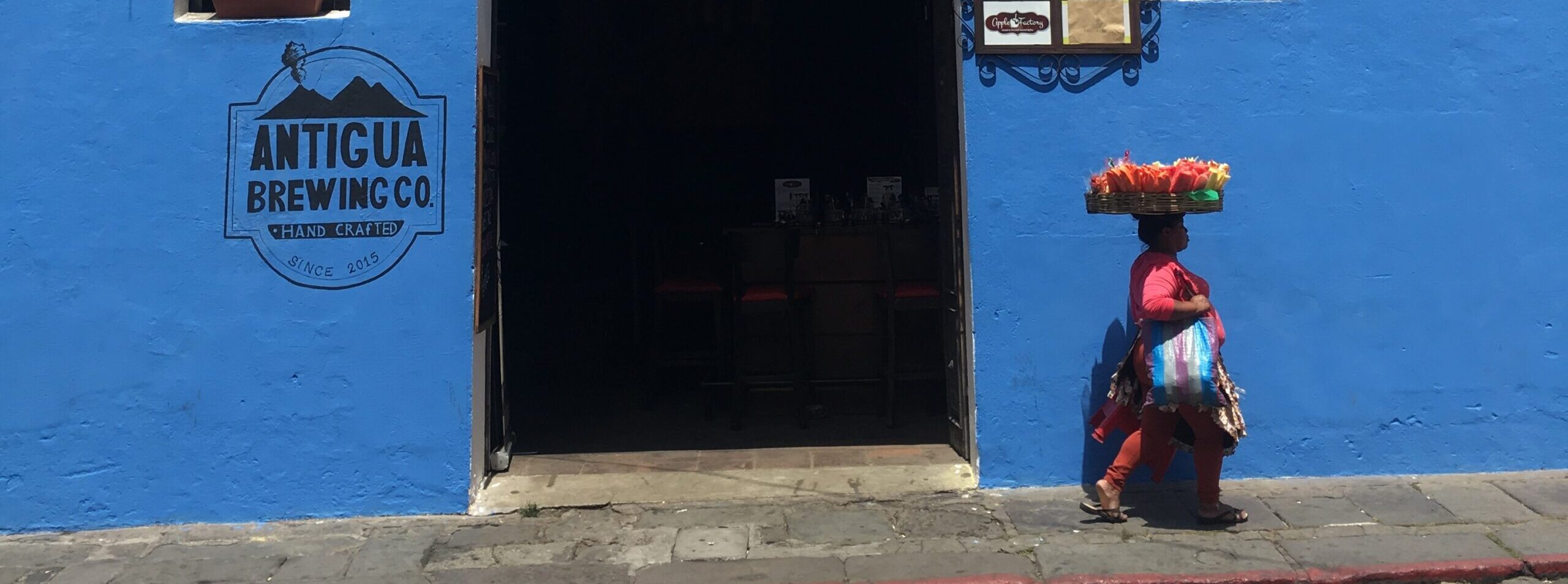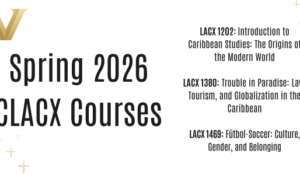Mayan Studies
Vanderbilt is a recognized leader in Mayan Studies with a particular strength in Guatemala. We are one of the few universities in the US that offers instruction in K’iche’ Mayan, spoken by approximately 1 million people, and Vanderbilt has trained a number of Mayan PhDs. Faculty and students from anthropology, political science, medicine, nursing, engineering, education, business and other fields collaborate on related interdisciplinary initiatives, and over 50 students travel to the region each year for research, language study, or service-learning projects. This on-campus scholarship informs our public engagement for K-12 educators and the general public, as well as educational performing arts programming, such as the Amazing Twins marionette show developed with the Nashville Public Library, and the documentary film La Camioneta, directed by alum Mark Kendall.
Courses of Study and Abroad Experiences
Academic Year K’iche’ Mayan: Vanderbilt is one of the only universities in the US that teaches academic year instruction in the K’iche’ Mayan language. We offer a four-semester sequence of K’iche’ instruction, which includes regular one-on-one conversational sessions between students and native speakers, with courses taught by Mareike Sattler. In 2015, Vanderbilt, Duke/UNC, and the University of Virginia began a distance language partnership that expanded AY instruction of K’iche’ Mayan to students at those universities. The importance of K’iche’ is relevant locally, as the number of K’iche’ speakers has increased in Metro Nashville Public Schools in recent years. The recent influx of emigrants from Central America to the US has also led to a greater national demand for speakers of Mayan languages, particularly Mam, K’iche’, and Q’anjob’al.
CLACX collaborates with Tulane University to offer a FLAS-approved summer field school in Guatemala, the Mayan Language Institute. The MLI offers six weeks of immersion in K’iche’ and Kaqchikel Mayan language; Vanderbilt’s Mareike Sattler leads the K’iche’ program. Students studying K’iche’ live with host families in Nahualá. It is the only intensive program in the United States for the study of these languages, which are two of the most widely spoken Mayan languages. The K’iche’ program was founded by Vanderbilt in 2008, and merged with Tulane’s Kaqchikel summer program in 2014 to create the Mayan Language Institute. In 2019, Antigua-based Proyecto Lingüístico Francisco Marroquín (PLFM) joined the MLI partnership. Founded in 1969, PLFM is the oldest language school in Guatemala and is dedicated to teaching and preserving Guatemala’s Mayan languages and teaching Spanish.
View Memoriam for Manuel de Jesus Tahay Gomes, former head teacher and local coordinator for the Mayan Language Insitute-K’iche’ in Nahualá.
The Medical Spanish and Central America Seminar provides training for pre-specialty students in Vanderbilt’s Nursing School and students at Meharry Medical College. Students in the class delve into medical vocabulary, practice intake exams and patient interviews in Spanish, and learn about the history and culture of the Northern Triangle region, with a focus on issues of health and access to care. This effort is part of a larger CLACX initiative to support inter-professional learning and provide medical Spanish to Meharry and Vanderbilt students. Students must apply to join the class, and generally come with a basic-intermediate level of Spanish. A subset of VUSN students work with Primeros Pasos in the following Spring semester to carry out their QI project, and may have the opportunity to travel to Guatemala. The Medical Spanish and Central America Seminar is co-taught by Chalene Helmuth (Spanish) and Avery Dickins de Girón (LACX); Manola McCain (Nursing) leads the QI project and trip to Guatemala.
Immigration Practice Clinic: Karla McKanders directs the Immigration Practice Clinic for students in Vanderbilt’s Law School. As part of their training, students in the Practice Clinic prepare cases for individuals from Central Americans seeking asylum or guardianship.
Primeros Pasos: CLACX works closely with Primeros Pasos, a pediatric clinic located in the Palajunoj Valley on the outskirts of Guatemala’s second largest city, Quetzaltenango. The clinic serves 10 rural K’iche’ Maya communities. Undergraduate and graduate students from a variety of disciplines engage with the clinic through short or longer term experiences. Vanderbilt medical students participate in month-long clinical rotations, where they assist with mobile clinics, work alongside Primeros Pasos physicians and staff, and learn about health conditions, health systems, and health disparities particular to the Palajunoj Valley and Central America more generally. Students collaborate with staff to produce health educational resources in Spanish, and help support the clinic’s nutrition programs. Public Health students spend up to three months at Primeros Pasos during the summer for their practicum. Recent public health practica have emerged through “Essential Skills in Global Health,” a required course for MPH students pursuing the global health track. Projects have included refining monitoring and evaluation protocols for the clinic’s Healthy Schools program, providing interactive nutritional workshops for primary school classrooms and groups of local mothers, and developing curriculum manuals for the clinic’s robust volunteer program.
Students in Cynthia Paschal’s Biomedical Engineering course (BME 3890) travel to Guatemala to repair machinery in resource-limited hospitals during Spring Break, including: Hospital Materna Infantil de Juan Pablo II, Obras Sociales del Hermano Pedro, and Hospital Nacional Pedro de Bethancourt. Students also visit Universidad del Valle de Guatemala and exchange presentations with engineering students. Under the supervision of Paschal and Adams, Vanderbilt students have created 11 how-to videos, five which have been translated to Spanish with support from CLAS. The Spanish language videos have been viewed over 16,000 times. In addition, Paschal has collaborated with Prof. Carlos Esquit at UVG to establish a biomedical engineering program to help build capacity in the country.
Through Engineers Without Borders, Vanderbilt Students travel to Paxoj and Txemuj, two Mam Mayan-speaking communities in Guatemala, located near Quetzaltenango’s border with San Marcos. This ongoing project intends to reduce erosion to the primary school that serves the communities, and thus make it more accessible during the rainy season, as well as improve general drainage.
The “100,000 Strong in the Americas” grant between Vanderbilt and the Universidad del Valle (UVG) in Guatemala supports exchanges between engineering students and faculty around the topic of water and wastewater sustainability, with a specific focus on water and wastewater. Vanderbilt students enroll in CE 3705 Water Resources Engineering, ENVE 3610 Sustainable Development, or ENVE 4700 Energy and Water Resources, and then have the opportunity to travel to Guatemala during Spring Break to work alongside students from UVG. In 2019, students participated in a project to improve the management of water and energy sources in San Cristóbal El Alto. While there, the VU-UVG team analyzed the town’s water supply and treatment plant, municipal solid waste processes, and delivery of electricity. The longer-term goal of the initiative is to increase tourism and provide a sustainable economic benefit to the community. At Vanderbilt, the grant is spearheaded by Hiba Baroud (Engineering).
Focused on social enterprise and business in emerging markets, the Immersive Experience in Antigua gives undergraduate students the opportunity to examine ways local businesses can impact their communities. Students spend 10 days in Antigua during Winter Break, where they engage with businesses and organizations that span the social impact continuum, ranging from pure commercial enterprise to an operational charity. A typical day consists of studying business models and sustainable practices in the morning, followed by an examination of the practical application of such theories through site visits to organizations such as Grønn, Ecofiltro, Antigua Cerveza Company, and De la Gente. These experiences allow students to understand how workforce development translates to a bigger home for coffee farmers, or how improved access to clean water can impact attendance rates at rural schools. Other activities include guest lectures by leaders of companies based on a model of social enterprise. The Immersive Experience in Antigua is led by Greg Harvey and supported by the Vanderbilt Accelerator Program, in partnership with Owen’s Turner Family Center and CLAS.
Other courses include:
- ANTH 3202 Collapse of Civilizations
- ANTH 3242 Ancient Maya Civilizations
- ANTH 3243 Ancient Maya Gods and Rulers
- ANTH 3522 Classic Maya Language and Hieroglyphs
- ANTH 8110 Seminar in Maya Ethnography
- BME 3890: Service Learning in Guatemala
- IDIS 5618 Integrated Science Course: Global Health Immersion–Central America
- KICH 1102/5102 Elementary K’iche’ I
- KICH 1101/5101 Elementary K’iche’ II
- KICH 2201/5201 Intermediate K’iche’ I
- KICH 2202/5202 Intermediate K’iche’ II
- MGT 6554 Project Pyramid
- MHS 3210 Health, Development, and Culture in Guatemala
- N5105, 5205, 5305 Enhancing Community & Population Health I, II, III
Research
Arthur Demarest (Anthropology) leads the Cancuen Archaeological Project, located in the rainforest along the Pasión River in northern Alta Verapaz. The site is the largest and most important of the Upper Pasión river valley region, and was the capital and port city of an ancient very prosperous kingdom during the Late Classic Period, AD 657-800. It has much architecture still standing, including one of the largest palaces of fine stone masonry in the Maya world. Q’eqchi’ Mayan communities oversee the archaeological park, which is home to howler monkeys, toucans, and other endangered species.
Markus Eberl (Anthropology) leads the Tamarindito Archaeological Project, located in Guatemala’s tropical lowlands. The site was the seat of a royal dynasty during the Classic period. Eberl’s research examines the collapse of Classic Maya culture from the perspective of Maya commoners.
Ted Fischer (Anthropology) founded Listo Mani+, an award-winning social enterprise in Guatemala dedicated to addressing malnutrition. In collaboration with INCAP (Instituto de Nutrición de Centro América y Panamá), the Listo Mani+ team created a peanut-based RUSF (Ready to Use Supplemental Food) to combat the chronic malnutrition suffered by over half of children in Guatemala, which is particularly prevalent in Maya communities. Since 2009, the initiative has engaged numerous faculty and students from education, business, medicine, and anthropology and has produced published research as well as training opportunities Fischer currently serves on the board of the Maya Education Foundation.
Bill Fowler (Anthropology) conducts archaeological research on the conquest period in Mesoamerica. Since 1996 he has directed excavations at Ciudad Vieja, El Salvador, the site of the first villa of San Salvador, founded in 1525 and abandoned in 1545. Although it was established as a Spanish-conquest city, San Salvador was principally occupied by Nahua-speaking Pipils of the region and Tlaxcalans from central Mexico who settled there as allies of the Spaniards. Through his research at Ciudad Vieja, Professor Fowler explores issues of culture contact and culture change during the first generation of the Conquest, and the ethnohistory of the pre-Columbian Pipils and other Nahua groups of Central America.
Jon Hiskey (Political Science) conducts research on the political implications of migration for sending communities across Latin America, analyzing the political lives of those individuals with connections to a migrant network and the role they play in community politics. Recent work has focused on asylum seekers from Central America’s Northern Triangle and the local push factors that are encouraging emigration to the United States.
Norbert Ross (Anthropology) receives support from the Fulbright commission and the NSF to study how children in El Salvador experience and cope with violence, and the long terms effect of gang and other violence on children. As part of his research, Ross uses an innovative theatre approach, blending aspects of popular theatre, improv theatre, playback theatre, and drama therapy to explore new ways of combining research and support. Previous research projects focused on the Lacandon Maya in southern Mexico and the Itzá Maya of the Petén, Guatemala.
Public Engagement
CLACX partners with local arts organizations to bring educational experiences to the public and develop curricular content for K-12 teachers on issues relating to the Maya communities.
CLACX works with the Metro Nashville Public Schools’ Office of English Learners to provide professional development to local K-12 educators, particularly teachers in the Students with Interrupted Formal Education (SIFE). Over 25% of MNPS students are classified as English Learners. While Spanish is the most widely spoken language by foreign-born students in MNPS, many students speak Mayan languages as a first language, with Achi, K’iche’, Chuj, Mam, and Q’eqchi’ most represented. “Working with CLAS has been pivotal in providing our English Learner, content and administrators with professional learning directly related to their daily experience in their diverse classrooms,” said Megan Trcka, MNPS EL Coordinator. Since 2019, over 300 teachers have attended professional development programs provided by the center.
In collaboration with the Nashville Public’s Library’s Wishing Chair Productions, the center funded and helped create The Amazing Twins, a marionette show based on the Popol Vuh, the sacred text of the K’iche’ Maya people. The show is part of NPL’s permanent repertoire, and regularly tours branch libraries and elementary schools.
La Camioneta (2012) is an award winning documentary film that was directed by LAS alum Mark Kendall (MA, 2008) and supported by CLAS. The film follows the transformative journey of a decommissioned school bus as it travels southward from the US to Guatemala, where it is repaired and repainted to become a colorful camioneta that carries Guatemalans to and from work each day.
Return to Sender is an original production created by the Nashville Children’s Theatre and supported by CLACX. Based on the novel by Julia Alvarez, the NCT performance debuted in October 2019. The play examines the interdependent relationships that form between a family of farm owners in Vermont and a migrant family. Alvarez received the Pura Belpré Award for the book, as well as the Américas Award that is organized through Vanderbilt’s CLACX on behalf of Latin American Studies programs across the country
Library
Vanderbilt’s Mesoamerican anthropology and archaeology collection is a designated national resource by the Association of Research Libraries’ Global Resources Program and the Latin Americanist Research Resources Project. With university and NRC funding, we have expanded Mayan language collections in recent years, and now have over 780 items, including software for language instruction. Bibliographer Paula Covington travels to Guatemala each year to purchase recent publications and special collections that would otherwise be unavailable.
Vanderbilt Faculty Working on Mayan Studies
Arthur Demarest
Avery Dickins de Girón
Ted Fischer
Markus Eberl
T.S. Harvey
Jon Hiskey
Karla McKanders
Manola McCain
Cynthia Paschal
Norbert Ross
Mareike Sattler
Brent Savoie




